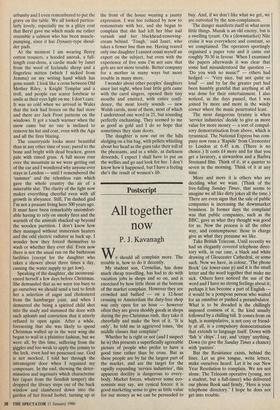Postscript
All together now
P. J. Kavanagh We should all complain more. The trouble is, how to do it decently.
My student son, Cornelius, has done much cheap travelling, has had to do with vacation jobs in shops and so on, and is exercised by how little those at the bottom of the market complain. However they are crowded and bullied — on a 12-hour crossing to Amsterdam the duty-free shop was only open for an hour — however often they are given shoddy goods in shops during the pre-Christmas rush, they take it cheerfully and make the best of it. 'It is only', he told me in aggrieved tones, 'the middle classes that complain!'
Whether he is right or not (and I suspect he is) this presents a superficially agreeable picture of people who prefer to have a good time rather than be cross. But as these people are by far the largest part of the market, and are the target for the rapidly expanding 'service industries', this apparent docility is dangerous to every- body. Market forces, whatever some eco- nomists may say, are cynical forces: it is good marketing sense to give as little value for our money as we can be persuaded to buy. And, if we don't like what we get, we are outvoted by the non-complainers.
The danger manifests itself in what seem little things. Muzak is an old enemy, but is a swelling tyrant. On a (downmarket) Nile cruise it was everywhere and constant, so we complained. The operators sportingly organised a paper vote and it came out roughly 70-30 in favour. When I examined the papers afterwards it was clear that some had misunderstood the question 'Do you wish no music?' — others had hedged — 'Very nice, but not quite so loud' — and by far the greater part had been humbly grateful that anything at all was done for their entertainment. I also noticed, as the days passed, that I was joined by more and more in the windy corner where the music penetrated least.
The most dangerous tyranny is when `service industries' decide to give us more value for more money — a sort of compul- sory democratisation from above, which is tyrannical. The National Express bus com- pany now runs a `Rapide' from Cirencester to London at 6.45 a.m. (There is no choice.) It costs £4 more and for that you get a lavatory, a stewardess and a Barbra Streisand film. Think of it, at a quarter to seven in the morning. Think of it at any time.
More and more it is others who are deciding what we want. (Think of the free-falling Sunday Times, that seems to imagine we all like dirty jokes all the time.) There are even signs that the sale of public companies is increasing the downmarket bossiness. In former days the complaint was that public companies, such as the BBC, gave us what they thought was good for us. Now the process is all the other way, and contemptuous: those in charge give us what they presume we like.
Take British Telecom. Until recently we had an elegantly covered telephone direc- tory with, in our case, a black and white drawing of Gloucester Cathedral, or some such. Now we have, in colour, 'The phone Book' (sic lower-case p) and it is the small letter and the word together that make me sick. Others have noticed the use of the word and I have no strong feelings about it; perhaps it has become a part of English it would be a pompous person who waited for an omnibus or pushed a perambulator. What is to be dreaded is the chillingly imposed cosiness of it, the kind usually followed by a chilling bill. It comes from on high, is manipulative, is not cosy or friend- ly at all, is a compulsory democratisation that extends to language itself. Down with `fish 'n' chips', I say, and 'crispy' anything. Down (to give the Sunday Times a chance) with 'panties'.
But the Resistance exists, behind the lines. Let us give tongue, write letters, make ourselves heard. Let it be our New Year Resolution to complain. We are not alone. The Telecom operative (young, not a student, but a full-timer) who delivered our phone Book said firmly, 'Here is your telephone directory.' I hope he does not get into trouble.


























































 Previous page
Previous page